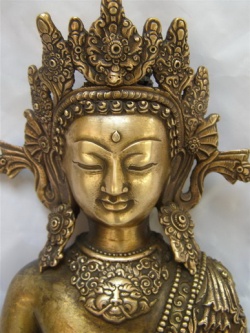Difference between revisions of "10 precepts"
| (3 intermediate revisions by 2 users not shown) | |||
| Line 1: | Line 1: | ||
{{DisplayImages|946|1141|404}} | {{DisplayImages|946|1141|404}} | ||
| + | |||
| + | |||
| + | |||
| + | |||
| + | |||
| + | |||
| + | |||
<poem> | <poem> | ||
The [[Ten Precepts]] are sometimes considered a summary of the most important [[precepts]] of the [[monastic]] [[monks and nuns]] of [[Theravada]] [[Buddhism]]. | The [[Ten Precepts]] are sometimes considered a summary of the most important [[precepts]] of the [[monastic]] [[monks and nuns]] of [[Theravada]] [[Buddhism]]. | ||
| − | These training rules are observed by [[novice]] [[monks and nuns]]. They are derived from the [[8 precepts]] by splitting the [[precept]] concerning entertainments into two parts and by adding one rule prohibiting the handling of [[money]]. | + | These [[training rules]] are observed by [[novice]] [[monks and nuns]]. They are derived from the [[8 precepts]] by splitting the [[precept]] concerning entertainments into two parts and by adding one {{Wiki|rule}} prohibiting the handling of [[money]]. |
| − | A fully [[ordained]] [[monk]] ([[bhikkhu]]) observes the 227 rules of the [[bhikkhu]] [[Patimokkha]]; a fully [[ordained]] [[nun]] ([[bhikkhuni]]) would observe the 311 rules of the [[bhikkhuni]] [[Patimokkha]]. | + | A fully [[ordained]] [[monk]] ([[bhikkhu]]) observes the 227 {{Wiki|rules}} of the [[bhikkhu]] [[Patimokkha]]; a fully [[ordained]] [[nun]] ([[bhikkhuni]]) would observe the 311 {{Wiki|rules}} of the [[bhikkhuni]] [[Patimokkha]]. |
==The [[Ten Precepts]] in [[Pali]] and English== | ==The [[Ten Precepts]] in [[Pali]] and English== | ||
| Line 43: | Line 50: | ||
{{R}} | {{R}} | ||
[http://www.dhammawiki.com/index.php?title=10_precepts www.dhammawiki.com] | [http://www.dhammawiki.com/index.php?title=10_precepts www.dhammawiki.com] | ||
| − | [[Category:Ten precepts]] | + | [[Category:Ten precepts]]{{BuddhismbyNumber}} |
Latest revision as of 12:00, 29 December 2023
The Ten Precepts are sometimes considered a summary of the most important precepts of the monastic monks and nuns of Theravada Buddhism.
These training rules are observed by novice monks and nuns. They are derived from the 8 precepts by splitting the precept concerning entertainments into two parts and by adding one rule prohibiting the handling of money.
A fully ordained monk (bhikkhu) observes the 227 rules of the bhikkhu Patimokkha; a fully ordained nun (bhikkhuni) would observe the 311 rules of the bhikkhuni Patimokkha.
==The Ten Precepts in Pali and English==
1. Panatipata veramani sikkhapadam samadiyami
2. Adinnadana veramani sikkhapadam samadiyami
3. Abrahmacariya veramani sikkhapadam samadiyami
4. Musavada veramani sikkhapadam samadiyami
5. Suramerayamajja pamadatthana veramani sikkhapadam samadiyami
6. Vikalabhojana veramani sikkhapadam samadiyami
- I undertake the precept to refrain from eating at the forbidden time (i.e., after noon).
7. Nacca-gita-vadita-visuka-dassana veramani sikkhapadam samadiyami
8. Mala-gandha-vilepana-dharana-mandana-vibhusanatthana veramani sikkhapadam samadiyami
9. Uccasayana-mahasayana veramani sikkhapadam samadiyami
10. Jatarupa-rajata-patiggahana veramani sikkhapadam samadiyami
(from Digha Nikaya 1; Vinaya, Mahavagga I 56.1)


